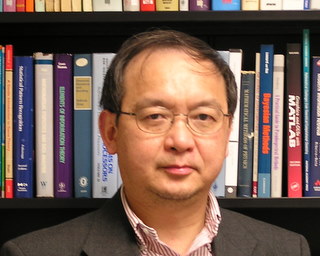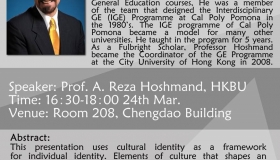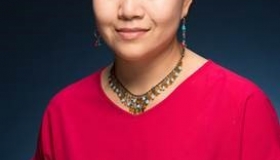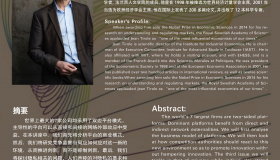【学术会议】L21 Norm and Trace Norm: Sparse Coding and Low-rank Matrix Models for Data Recovery and Feature Selection - Prof. Chris H.Q. Ding
主题: L21 Norm and Trace Norm: Sparse Coding and Low-rank Matrix Models for Data Recovery and Feature Selection
报告人: Prof. Chris H.Q. Ding, University of Texas at Arlington
时间: 14:00 - 15:00, Monday, August 19, 2019
地点: Boardroom, Dao Yuan Building
摘要:
Sparse coding and low rank models are recently developed techniques in machine learning, widely used for robust data recovery (recover severely corrupted images) and feature selection (select genes responsible a disease) . Sparse coding uses L21 norm based multi-class feature selection. Trace norm regularization recently emerged as the popular formalism to enforce low rank in data representation. Robust data recovery uses L1 or L21 norms as error functions. Dictionary learning obtains data representations better than PCA by learning the sparse codes. Many new ideas and variants have been proposed. We survey these new and growing research areas.
简介:

Chris H.Q. Ding studied in the research group of Professor Li Zhengdao of Columbia University, USA, and obtained a Ph.D. degree in the California Institute of Technology, Jet Power Lab, Lawrence-Berkeley National Laboratory. He joined the University of Texas at Arlington in 2007 as a tenured professor. His research areas are data mining, machine learning, information retrieval, and high performance computing. The research results were introduced and described by the Science and Nature Journal as a cover. He has done original work in the fields of low rank, dimensionality reduction, non-negative matrix factorization, spectral clustering, etc.. Besides, the concept of matrix L21 norm was first proposed by him. He has published more than 200 high-level papers which has been cited more than 41,300 times. His paper published in the IEEE TPAMI was cited 6660 times. In 2018, the world's Top 1000 computer and electronic engineering scientists ranked by H index, 71 Chinese scholars were on the list, and Chris H.Q. Ding was ranked 30.




